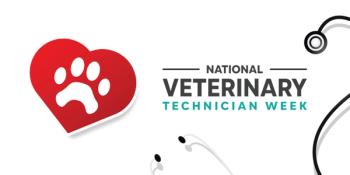
Animal activism runs rampant through states
Sacramento, Calif.- Dr. Dick Schumacher's schedule seems rather demanding these days. As the California Veterinary Medical Association's (CVMA) executive director struggles to stifle declaw bans and activist-laden welfare bills, rumors now surface that at least six petitions are circulating to outlaw sow housing and veal compartment crates. Less than a million signatures guarantee these issues a spot on the ballot next March.
Sacramento, Calif.- Dr. Dick Schumacher's schedule seems rather demanding these days. As the California Veterinary Medical Association's (CVMA) executive director struggles to stifle declaw bans and activist-laden welfare bills, rumors now surface that at least six petitions are circulating to outlaw sow housing and veal compartment crates. Less than a million signatures guarantee these issues a spot on the ballot next March.
Dr. Dick Schumacher
California appears a hotbed for animal activism, but the state isn't alone. New Jersey and Florida each are dealing with repeated attempts by activists to gain ground on new laws. Whether wearing down courts and state legislatures to increase the economic value of pets or protesting bans on feral cat programs, animal activism is on the move and marching across the United States.
"There's no question that the veterinary profession has been targeted," says Dr. Gayle Golab, the American Veterinary Medical Association's (AVMA) assistant director for professional and public affairs. "You're basically up against organizations with a total combined staff of 500 and an annual budget of $300 million. Trying to combat these groups can be a real tough thing to do."
Dr. Gayle Golab
Nowhere was financial railroading more evident last year than in Florida, where Farm Sanctuary spurred a referendum to outlaw sow gestation stalls in a state with just a handful of pig farms. Roughly $700,000 in activist-funded television spots helped make Florida the country's first state to ban a factory farming practice. The Florida Veterinary Medical Association (FVMA) just didn't have the resources to compete, Executive Director Donald Schaefer says.
Profession deemed underdogs
Donald Schaefer
"What a wakeup call," he says. "Their goal was to set a precedent and that's clearly what they've done. The good news is we've now witnessed how these organizations are focused and funded to achieve legislative goals in the state. There were lessons learned, I'll tell you that."
It's no secret Farm Sanctuary and other activist organizations target states where enacting welfare laws will have little economic impact, thereby smoothing their passage.
Freeing the floodgates
Although Farm Sanctuary President Gene Bauston admits the Florida issue "opened up many new possibilities," he denies fueling the California petitions. Instead, he's working to resurrect a bill buried in a committee of the California Senate.
"Bill 1478 bans veal crates and anemic diets, and we plan to have it reintroduced in January," he says. "I believe it has a reasonable chance of passing next year. It's certainly a lot cheaper to go through the Legislature than it is to fund a statewide referendum."
Assuming the offense concerning the legal status of companion animals could cement the New Jersey Veterinary Medical Association's (NJVMA) influence as the movement to deem pets worth more than property takes hold, Executive Director Rick Alampi says.
Allaying the inevitable
The NJVMA plans to head off animal rights attempts to increase pet status, introducing legislation defining sentimental value for companion animals and thereby permitting lawsuits seeking emotional distress or loss of consortium awards in malpractice or wrongful death cases (see Aug. 2003 issue, p. 9).
The new language, as defined by NJVMA, would maintain pets are property while recognizing emotional attachment associated with the human-animal bond. At presstime, the group was in talks to tag monetary worth to what promises to set revolutionary legal precedent.
"New Jersey has taken a different approach and hopes to create a movement that will value animals as more than a car but not equate them with a human life, specifically the life of a spouse or child," says Dr. Charlotte Lacroix, a legal expert crafting the association's bill.
Future welfare challenges facing New Jersey are not likely to come from outside activist groups but from within. Last spring, Governor James E. McGreevey appointed the Animal Welfare Taskforce after a crackdown at the New Jersey Societies for the Prevention of Cruelty to Animals revealed the group was embezzling money, abusing its power and harming animals. While its mission to examine enforcement statutes, shelters and pet overpopulation is admirable, Alampi is concerned the taskforce's agenda stretches beyond its charge.
Feeling the heat
"The report by this task force is due next March and should address the guardianship/ownership issue," he says. "I also suspect they may want to require veterinarians to do pro bono work like attorneys and expand the state's cruelty statutes. While these issues have both positive and negative impacts to the profession, the ultimate affect will be on the practitioner's bottom line."
Newsletter
From exam room tips to practice management insights, get trusted veterinary news delivered straight to your inbox—subscribe to dvm360.






